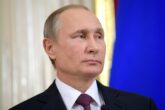October 22, 2021
Reimagining the Eastern Partnership: It is time for the European Union to embrace the Associated Trio
The European Union’s Eastern Partnership (EaP) is facing an identity crisis. In the years since the programme’s inception, the bloc’s relationships with its six former Soviet neighbours have diverged into two distinct groupings. On the one hand, Georgia, Moldova and Ukraine have pushed resolutely forward on their path to European integration. These states now cooperate as part of the Associated Trio format in order to advance their common goal of EU membership. On the other hand, Armenia, Azerbaijan and Belarus have strayed far from EU values and have shown a lack of commitment to deepening relations. Brussels can no longer ignore this dichotomy. As a result, the European Union must fully embrace the Associated Trio if it wishes to achieve its strategic goals in its eastern neighbourhood.
By offering a dedicated approach to the Associated Trio, the European Union stands to gain geopolitical influence in the region.
The 2009 Prague Joint Declaration that established the EaP outlined shared ambitions to “accelerate political association and further economic integration between the European Union and interested partner countries.” The declaration also noted that relations would be “based on commitments to the principles of international law and to fundamental values, including democracy, the rule of law, and the respect for human rights.” Although the European Union took care not to explicitly link EaP membership to eventual EU accession, the geostrategic rationale for the framework was evident. By promoting the internal transformation of the six EaP countries in line with its own values, the European Union stood to benefit from increased stability on its borders as well as heightened regional influence in relation to Russia.
Read the full article from New Eastern Europe.
More from CNAS
-
Trump ‘Humiliated’ as Putin Sends Clear Message That He Doesn’t Care About US
"Putin is not playing ball." Putin's Palm Sunday attack on Sumy is "embarrassing for the White House" as it comes just days after Steve Witkoff met with the Kremlin, says adju...
By Jim Townsend
-
The Hidden Past and Uncertain Future of the U.S. and Ukraine with Celeste Wallander
Under the Trump administration, U.S. support for Ukraine is no longer guaranteed. President Trump's pause on aid and intelligence to Ukraine in March may have been brief, but ...
By Andrea Kendall-Taylor, Jim Townsend & Celeste Wallander
-
Is Russia Under Pressure?
Since 2014, the United States and its allies have provided increasing military support to Ukraine while imposing more and tougher economic sanctions on Russia, especially sinc...
By Jeffrey Edmonds
-
Europe's Trade War Woes
On April 2nd, President Trump imposed sweeping tariffs across the globe – with only a handful of countries left untouched. The EU was hit with tariffs of 20% and the European ...
By Andrea Kendall-Taylor & Jim Townsend



